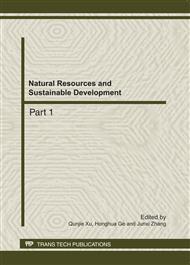[1]
Berndes G, Hoogwijk M, van den Broek R. The contribution of biomass in the future global energy supply: a review of 17 studies. Biomass and Bioenergy 2003; 25:1–28.
DOI: 10.1016/s0961-9534(02)00185-x
Google Scholar
[2]
Allen J, Browne M, Hunter A, Boyd J, Palmer H. Logistics management and costs of biomass fuel supply. International Journal of Physical Distribution and Logistics Management 1998; 28(6):463–77
DOI: 10.1108/09600039810245120
Google Scholar
[3]
Cundiff J, Dias N, Sherali H. A linear programming approach for designing a herbaceous biomass delivery system. Bioresource Technology 1997,59,47–55
DOI: 10.1016/s0960-8524(96)00129-0
Google Scholar
[4]
Caputo A, Palumbo M, Pelagagge P, Scacchia F. Economics of biomass energy utilization in combustion and gasification plants: effects of logistics variables. Biomass and Bioenergy 2005,28,35–51
DOI: 10.1016/j.biombioe.2004.04.009
Google Scholar
[5]
Athanasios A. Rentizelas ,Athanasios J. Tolis, Ilias P. Tatsiopoulos. Logistics issues of biomass: The storage problem and the multi-biomass supply chain. Renewable and Sustainable Energy Reviews 13 (2009) 887–894
DOI: 10.1016/j.rser.2008.01.003
Google Scholar
[6]
Cachon, G. amdLariviere, M. (2000). Supply chain coordination with revenue-sharing contracts strengths and cinitations [R]. Philadelphia University of Penn-sylvania, (2000)
Google Scholar
[7]
Ye, Fei (2006). Research on Revenue Sharing Contract Mechanism of Supply Chain with Risk Averse Agent [J]. Industrial Engineering and Mamagement, 2006, 11 (4) :50254
Google Scholar
[8]
Sheng Xuxiong. Study on the entrepreneur's risk preference, incentive motivation and market constraints. Zhongnan University of Finance and Economics Academic Journal, 1997,5: 39-43.
Google Scholar
[9]
Yang zhiyu, Ma shihua. Study on the Principal-agent Problem in Supply Chain Enterprises. CIMS.2001,7( 1):19 -22
Google Scholar
[10]
Zhang Jing. Study on Supply Chain Coordination and Incentive under Asymmetric Risk Preference. Master Degree thesis of Nanjing University of Science and Technology, (2007)
Google Scholar
[11]
He Yong. Studied on supply chain contract with random market demand PhD. Degree thesis of Dalian University of Science and Technology, (2004)
Google Scholar
[12]
YU Ming-jin, WANG Ju-xiang, SANG Sheng-ju. Study on Revenue Sharing Contract Mechanism in Supply Chain under risk Preference. SCIENCETECHNOLOGY AND ENGINEERING 2008, 8(22)
Google Scholar


